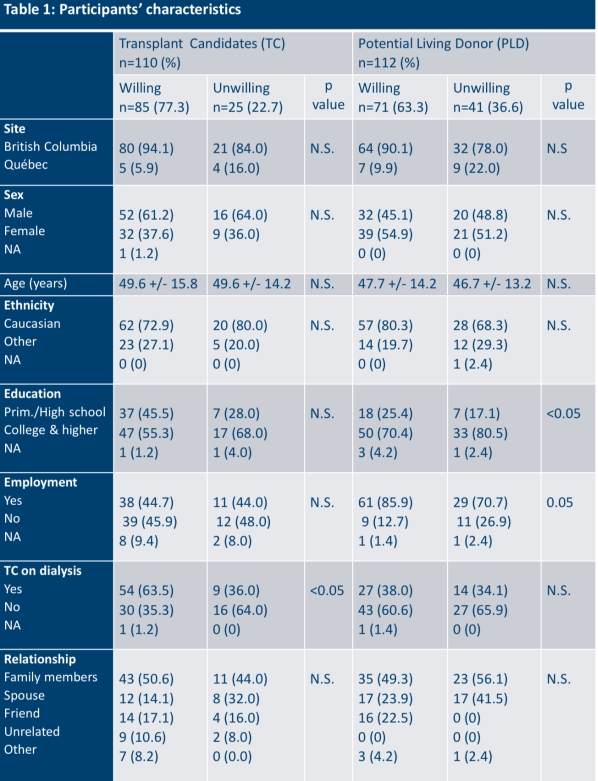Transplant Candidates and Potential Living Kidney Donors Are Supportive of Reciprocity for Transplant Candidates Who Participate in Kidney Paired Donation with a Compatible Donor
1UBC, Vancouver, Canada
2Centre de Recherche du CHUM, Montreal, Canada.
Meeting: 2018 American Transplant Congress
Abstract number: A158
Keywords: Donation, Kidney transplantation
Session Information
Session Name: Poster Session A: Kidney Paired Exchange
Session Type: Poster Session
Date: Saturday, June 2, 2018
Session Time: 5:30pm-7:30pm
 Presentation Time: 5:30pm-7:30pm
Presentation Time: 5:30pm-7:30pm
Location: Hall 4EF
The inclusion of compatible pairs in kidney paired donation (KPD) is a strategy to increase transplantation for incompatible pairs in KPD. We proposed a reciprocity based strategy whereby a transplant recipient would be guaranteed a priority for repeat deceased donor transplantation if the KPD transplant fails in exchange for the compatible pair's participation in KPD.
We prospectively surveyed 110 transplant candidates (TC) and 112 potential living donors (PLD) during their assessment for a compatible kidney transplant at 3 Canadian centres on their willingness to enroll in KPD as a compatible pair and their views on a reciprocity based strategy.
Results: 77.3% of TCs and 61.3% of PLDs were willing to participate in KPD as a compatible pair. Characteristics of TCs and PLDs by their willingness to participate in KPD are outlined in the table.
Proving a better HLA match or younger donor via KPD increased willingness to participate, with 94% of TCs and 100% of PLDs more willing to participate under these circumstances. A delay of >6 months due to KPD decreased willingness to participate in KPD (72% of TC and 85% of PLD were less willing).
A reciprocity based strategy was acceptable to TCs and PLDs, with 80.9% of TCs and 86.6% of PLDs more willing to participate in KPD as a compatible pair if the TC was guaranteed a priority for repeat transplantation if the KPD transplant failed within the 1st post transplant year. Offering reciprocity for TCs whose KPD transplant failed beyond the 1st year did not further increase willingness to participate in KPD.
Discussion: Most compatible TCs and PLDs were willing to participate in KPD, especially if there was an advantage to the recipient. Guaranteeing a priority for repeat transplantation to compatible TCs who enroll in KPD may increase participation of compatible pairs in KPD. While further studies are required to evaluate the acceptability of a reciprocity based strategy by wait listed patients and the public, these results suggest consideration of a reciprocity based approach to expand participation of compatible pairs in KPD.
CITATION INFORMATION: Gill J., Gill J., Ballesteros F., Fortin M. Transplant Candidates and Potential Living Kidney Donors Are Supportive of Reciprocity for Transplant Candidates Who Participate in Kidney Paired Donation with a Compatible Donor Am J Transplant. 2017;17 (suppl 3).
To cite this abstract in AMA style:
Gill J, Gill J, Ballesteros F, Fortin M. Transplant Candidates and Potential Living Kidney Donors Are Supportive of Reciprocity for Transplant Candidates Who Participate in Kidney Paired Donation with a Compatible Donor [abstract]. https://atcmeetingabstracts.com/abstract/transplant-candidates-and-potential-living-kidney-donors-are-supportive-of-reciprocity-for-transplant-candidates-who-participate-in-kidney-paired-donation-with-a-compatible-donor/. Accessed February 18, 2026.« Back to 2018 American Transplant Congress
